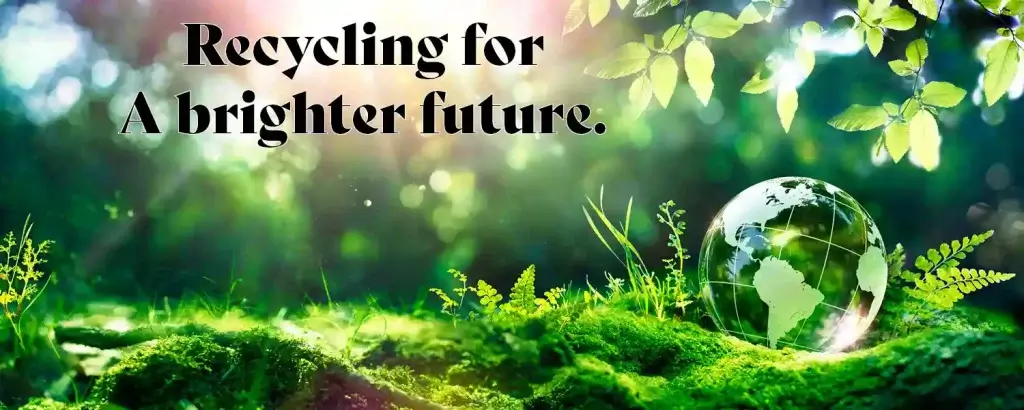When considering your next home improvement project, especially one involving windows, doors, or a conservatory, you may come across the term “closed loop recycling.” But what does it mean, and how can it benefit you and the environment? Here is a guide to this concept, along with its numerous advantages. Let’s explore the world of closed loop recycling and see how it can make a difference in your next home improvement project.
Closed loop recycling is a sustainable process where materials are collected, recycled, and then used to create new products of the same type. Essentially, it’s a cycle where waste materials are continually repurposed, reducing the need for new raw materials.
This process is particularly relevant in the manufacture of windows and doors, where materials such as aluminium, uPVC, and glass can be recycled efficiently.

How It Works
Closed loop recycling comprises multiple steps. Initially, materials are collected from consumers and businesses. These are then sorted and cleaned to eliminate impurities. Subsequently, they are processed and converted into raw materials suitable for manufacturing new products. This process repeats, establishing a sustainable cycle that reduces waste and preserves resources.
The Environmental Benefits of Closed Loop Recycling
One of the primary reasons to adopt closed loop recycling in your next home improvement project is its beneficial impact on the environment. Here’s how it helps:
Reducing Waste
Closed loop recycling significantly reduces the amount of waste sent to landfills. By continually recycling materials, we reduce the need for landfill space, a growing concern in many areas. This decrease in waste also minimises the release of harmful chemicals and greenhouse gases that result from waste decomposition.
Conserving Natural Resources
Each time we recycle a material, we reduce our reliance on new raw resources. For instance, recycling aluminium conserves 95% of the energy required to produce it from raw materials. This resource conservation not only safeguards natural habitats but also diminishes energy consumption and carbon emissions, promoting environmental sustainability.
Job Creation
The recycling industry generates jobs in collection, sorting, and processing facilities. By supporting closed loop recycling, you’re also helping to grow an industry that provides employment opportunities to many people.
Closed Loop Recycling in the Window and Door Industry
In the window and door industry, closed loop recycling is becoming more widespread. Manufacturers are utilising recycled aluminium, uPVC and glass to create high-quality, sustainable products. This approach not only benefits the environment but also provides homeowners with durable and energy-efficient options for their home improvement projects.
Recycled Aluminium
Aluminium is among the most recyclable materials, capable of being recycled endlessly without degrading in quality. Selecting windows and doors crafted from recycled aluminium means choosing products that are durable, lightweight, and environmentally sustainable.
Recycled uPVC
uPVC can be recycled up to 10 times while still maintaining its performance. With the average lifespan of a uPVC window or door being between 30 and 40 years, that results in a potential cumulative lifespan of 400 years from a single window or door.
Recycled Glass
Glass is another material that fits seamlessly into the closed loop recycling system. Recycled glass is used to produce new glass items, reducing the need for raw materials. This process decreases energy use and carbon emissions, making it a sustainable option for your home improvement projects.
Making Informed Home Improvement Project Decisions
Now that you understand the benefits of closed loop recycling, you can make more informed decisions when planning your next home improvement project.
Here are some tips to help you incorporate recycling into your next project:
Choose Sustainable Products
When choosing windows, doors, or a conservatory, opt for products made from recycled materials. Many manufacturers emphasise their use of recycled content, making it easier for you to select eco-friendly options.
Work with Reputable Suppliers
Partner with suppliers like Glevum Windows, who focus on sustainability in the manufacturing process. Such companies are more apt to provide products that meet your environmental objectives and guarantee quality and durability.
Consider the Full Life Cycle
Consider the entire life cycle of the products you select. Think about how they are produced, how long they last, and what happens to them once they are no longer helpful. Choosing products that can be recycled at the end of their life helps support a closed loop system.
Conclusion
Closed loop recycling is more than just a trend; it’s a sustainable practice that provides substantial benefits for the environment. By understanding and adopting this approach in your next home improvement project, you can enjoy high-quality, eco-friendly windows, doors, or a conservatory.
Making informed choices today will help create a greener tomorrow, ensuring your home not only looks beautiful but also promotes a brighter future.
If you have any questions or need guidance on your next door, windows or conservatory purchase, visit the Glevum website at www.glevum.co.uk or call 0800 332255 to request a free, no-obligation home visit by one of our experts.
